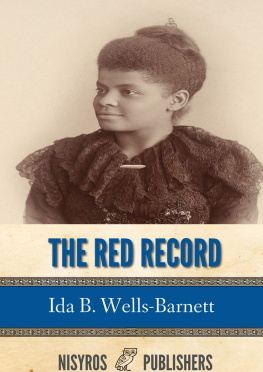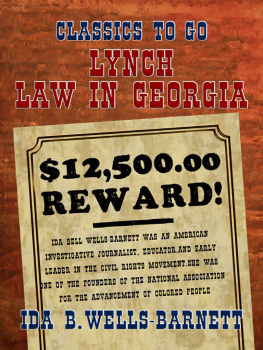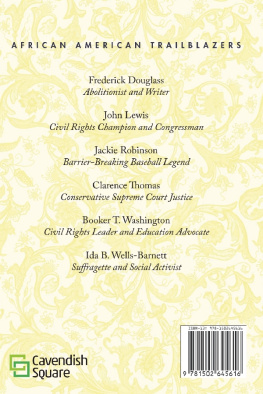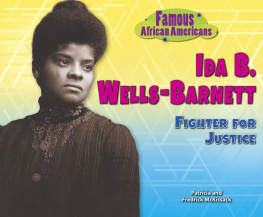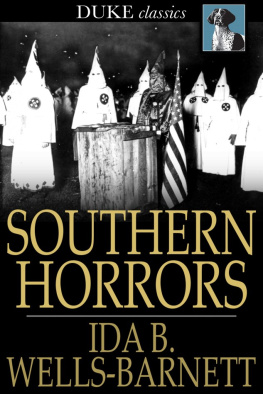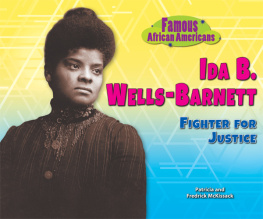Bibliographical Note
This Dover edition, first published in 2014, is an unabridged republication of Southern Horrors: Lynch Law in All Its Phases, originally published by New York Age Print, New York, in 1892, A Red Record: Tabulated Statistics and Alleged Causes of Lynchings in the United States 189218931894, originally published by Donohue & Henneberry, Chicago, in 1895, and Mob Rule in New Orleans: Robert Charles and His Fight to the Death, originally published by Ida B. Wells, Chicago, in 1900. The Dover edition has corrected typographical errors in the original text.
International Standard Book Number
eISBN-13:978-0-486-79364-1
Manufactured in the United States by Courier Corporation
77999801 2014
www.doverpublications.com
PREFACE
T HE GREATER PART of what is contained in these pages was published in the New York Age June 25, 1892, in explanation of the editorial which the Memphis whites considered sufficiently infamous to justify the destruction of my paper, The Free Speech.
Since the appearance of that statement, requests have come from all parts of the country that Exiled, (the name under which it then appeared) be issued in pamphlet form. Some donations were made, but not enough for that purpose. The noble effort of the ladies of New York and Brooklyn Oct 5 have enabled me to comply with this request and give the world a true, unvarnished account of the causes of lynch law in the South.
This statement is not a shield for the despoiler of virtue, nor altogether a defense for the poor blind Afro-American Sampsons who suffer themselves to be betrayed by white Delilahs. It is a contribution to truth, an array of facts, the perusal of which it is hoped will stimulate this great American Republic to demand that justice be done though the heavens fall.
It is with no pleasure I have dipped my hands in the corruption here exposed. Somebody must show that the Afro-American race is more sinned against than sinning, and it seems to have fallen upon me to do so. The awful death-roll that Judge Lynch is calling every week is appalling, not only because of the lives it takes, the rank cruelty and outrage to the victims, but because of the prejudice it fosters and the stain it places against the good name of a weak race.
The Afro-American is not a bestial race. If this work can contribute in any way toward proving this, and at the same time arouse the conscience of the American people to a demand for justice to every citizen, and punishment by law for the lawless, I shall feel I have done my race a service. Other considerations are of minor importance.
IDA B. WELLS.
New York City, Oct. 26, 1892.
To the Afro-American women of New York and Brooklyn, whose race love, earnest zeal and unselfish effort at Lyric Hall, in the City of New York, on the night of October 5th, 1892,made possible its publication, this pamphlet is gratefully dedicated by the author.
HON. FRED. DOUGLASSS LETTER.
Dear Miss Wells:
Let me give you thanks for your faithful paper on the lynch abomination now generally practiced against colored people in the South. There has been no word equal to it in convincing power. I have spoken, but my word is feeble in comparison. You give us what you know and testify from actual knowledge. You have dealt with the facts with cool, painstaking fidelity and left those naked and uncontradicted facts to speak for themselves.
Brave woman! You have done your people and mine a service which can neither be weighed nor measured. If American conscience were only half alive, if the American church and clergy were only half christianized, if American moral sensibility were not hardened by persistent infliction of outrage and crime against colored people, a scream of horror, shame and indignation would rise to Heaven wherever your pamphlet shall be read.
But alas! Even crime has power to reproduce itself and create conditions favorable to its own existence. It sometimes seems we are deserted by earth and Heavenyet we must still think, speak and work, and trust in the power of a merciful God for final deliverance.
Very truly and gratefully yours,
FREDERICK DOUGLASS.
Cedar Hill, Anacostia, D. C., Oct. 25, 1892.
CHAPTER I
THE OFFENSE
W EDNESDAY EVENING M AY 24th, 1892, the city of Memphis was filled with excitement. Editorials in the daily papers of that date caused a meeting to be held in the Cotton Exchange Building; a committee was sent for the editors of the Free Speech an Afro-American journal published in that city, and the only reason the open threats of lynching that were made were not carried out was because they could not be found. The cause of all this commotion was the following editorial published in the Free Speech May 21st, 1892, the Saturday previous.
Eight negroes lynched since last issue of the Free Speech one at Little Rock, Ark., last Saturday morning where the citizens broke (?) into the penitentiary and got their man; three near Anniston, Ala., one near New Orleans; and three at Clarksville, Ga., the last three for killing a white man, and five on the same old racketthe new alarm about raping white women. The same programme of hanging, then shooting bullets into the lifeless bodies was carried out to the letter.
Nobody in this section of the country believes the old thread bare lie that Negro men rape white women. If Southern white men are not careful, they will over-reach themselves and public sentiment will have a reaction; a conclusion will then be reached which will be very damaging to the moral reputation of their women.
The Daily Commercial of Wednesday following, May 25th, contained the following leader:
Those negroes who are attempting to make the lynching of individuals of their race a means for arousing the worst passions of their kind are playing with a dangerous sentiment. The negroes may as well understand that there is no mercy for the negro rapist and little patience with his defenders. A negro organ printed in this city, in a recent issue publishes the following atrocious paragraph: Nobody in this section of the country believes the old thread-bare lie that negro men rape white women. If Southern white men are not careful they will over-reach themselves, and public sentiment will have a reaction; and a conclusion will be reached which will be very damaging to the moral reputation of their women.
The fact that a black scoundrel is allowed to live and utter such loathsome and repulsive calumnies is a volume of evidence as to the wonderful patience of Southern whites. But we have had enough of it.
There are some things that the Southern white man will not tolerate, and the obscene intimations of the foregoing have brought the writer to the very outermost limit of public patience. We hope we have said enough.
The Evening Scimitar of same date, copied the Commercials editorial with these words of comment: Patience under such circumstances is not a virtue. If the negroes themselves do not apply the remedy without delay it will be the duty of those whom he has attacked to tie the wretch who utters these calumnies to a stake at the intersection of Main and Madison Sts., brand him in the forehead with a hot iron and perform upon him a surgical operation with a pair of tailors shears.


